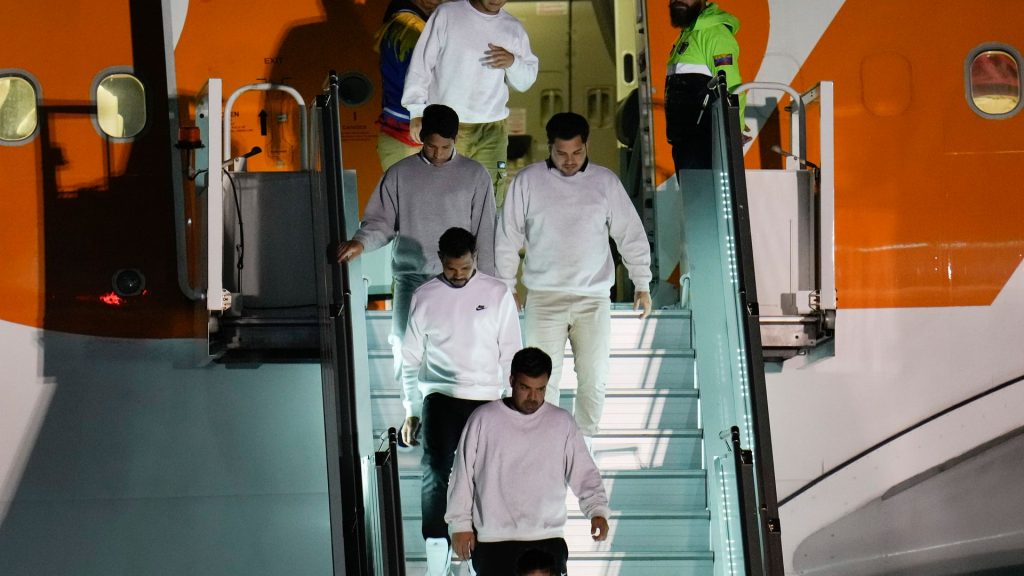SCOTUS temporarily blocks new deportations under Alien Enemies Act
Ella Greene April 19, 2025 0
- The Supreme Court temporarily blocked any further deportations of Venezuelan men held at an immigration detention center in northern Texas early Saturday. The ruling came after the ACLU filed an emergency appeal, arguing that the men’s removal from the country was “imminent.”
- In early April, the Supreme Court ruled that the Trump administration could deport Venezuelans under the Alien Enemies Act, but that any potential deportee must be given “reasonable time” to challenge their case.
- While a Justice Department attorney said that anyone at risk of being deported would have a “minimum” of 24 hours to challenge their removal, and that there weren’t any flights scheduled for Friday or Saturday, immigration lawyers say their clients have received paperwork and been loaded onto buses, “presumably headed to the airport.”
Full Story
The Supreme Court temporarily blocked any further deportations of Venezuelan men held at an immigration detention center in northern Texas early Saturday, April 19. The ruling, which specifically concerns deportations under the Alien Enemies Act of 1798 (AEA), came after an emergency appeal was filed by the American Civil Liberties Union (ACLU), arguing that the men’s risk of removal was “imminent,” despite an earlier Supreme Court ruling that mandated the Trump administration give any potential deportee “reasonable time” to challenge their case.
ACLU vs. DOJ
In its appeal, the ACLU wrote, “Many individuals have already been loaded on to buses, presumably headed to the airport,” adding some of the lawyers representing the Venezuelan men were informed that their clients “received notices that they are subject to removal under the AEA, and further were informed by government officials that they may be removed from the United States as soon as this afternoon or tomorrow.” The appeal was filed Saturday.
While the ACLU said that deportations could take place over the weekend, Drew Ensign, an attorney for the Justice Department, said that anyone at risk of being deported would have a “minimum” of 24 hours to challenge their removal, and that there weren’t any flights scheduled for Friday. He added that he was not aware of flights on Saturday either, according to The Associated Press.
U.S. Immigration and Customs Enforcement declined to comment on the litigation, according to the AP.
April rulings blocking AEA deportations
In Saturday’s brief order, the Supreme Court told the Trump administration to pause deportations from the Texas-based detention center “until further order of this court.” Justices Clarence Thomas and Samuel Alito dissented.
The Supreme Court took up the case after two federal judges refused to block the deportations Friday, April 18. The 5th U.S. Circuit Court of Appeals also declined to issue an order protecting the deportees on Saturday.
The new order follows a similar ruling on April 9 from federal judges barring the Trump administration from deporting migrants at facilities in Colorado, New York and southern Texas under the AEA. However, those orders did not cover those being held at Bluebonnet Detention Center, roughly 24 miles north of Abilene in Texas’ far north. As such, the ACLU’s request for an injunction specifically protects Venezuelan men who are being held there.
“We are deeply relieved that the Court has temporarily blocked the removals,” ACLU lawyer Lee Gelernt told the AP by email. “These individuals were in imminent danger of spending the rest of their lives in a brutal Salvadoran prison without ever having had any due process.”
What does the Warrant of Apprehension and Removal say?
Immigration and politics reporter for CBS News, Camilo Montoya-Galvez, obtained a Warrant of Apprehension and Removal issued to one of the Venezuelan men who was at risk of what the ACLU called “imminent removal.” In it, the Trump administration states that the individual was determined to be a member of the Venezuelan gang, Tren de Aragua, making them liable for deportation under the AEA. The warrant adds, “This is not a removal under the Immigration and Nationality Act.”
According to the AP, three immigration lawyers submitted sworn declarations explaining that their clients received similar paperwork. Immigration lawyer Karene Brown noted that the papers are only available in English, despite the fact that her client only speaks Spanish.
Meanwhile, Gelernt of the ACLU argued Friday evening before District Judge James E. Boasberg that the Trump administration had been moving detained Venezuelans to an immigration facility in south Texas, only to move them again to Bluebonnet following a federal judge’s ruling barring deportations from the south Texas facility.
Boasberg became a focal point in the Trump administration’s use of the AEA after he ordered a plane flying Venezuelans to El Salvador to be returned to the U.S. in March. The administration argued, among other points, that the plane was already flying over international waters and thus wasn’t subject to Boasberg’s ruling.
Similarly, earlier this week, Boasberg said that he had found probable cause to hold members of the Trump administration in criminal contempt after they refused to comply with his orders.
The ACLU says it’s not trying to block all deportations
In its filing Saturday, the ACLU notes that “Significantly, the relief sought here does not seek to prohibit the government from prosecuting any individual who has committed a crime. Nor does it seek release from immigration detention or prohibit the government from removing any individual who may lawfully be removed under the immigration laws.”
Rather, the ACLU’s request for an injunction seeks only to “preserve” the Supreme Court’s “status quo,” and keep the Venezuelan men from being “sent to a notorious prison in El Salvador before the American judicial system can afford them due process.”
The Trump administration is expected to appeal the Court’s ruling.
Related Stories
Ella Rae Greene, Editor In Chief
Ella Greene
Ella and the staff at Clear Media Project (CMP) curate these articles.
Unless otherwise noted CMP does not write these articles.
The views, thoughts, and opinions expressed in the articles published on this blog belong solely to the original authors and do not necessarily reflect the views of the blog owner. The blog owner does not claim ownership of the content shared by contributors and is not responsible for any inaccuracies, errors, or omissions.
All rights and credits goes to its rightful owners. No Copyright Infringement is intended. If you believe any content infringes on your rights, please contact us for review and potential removal.





